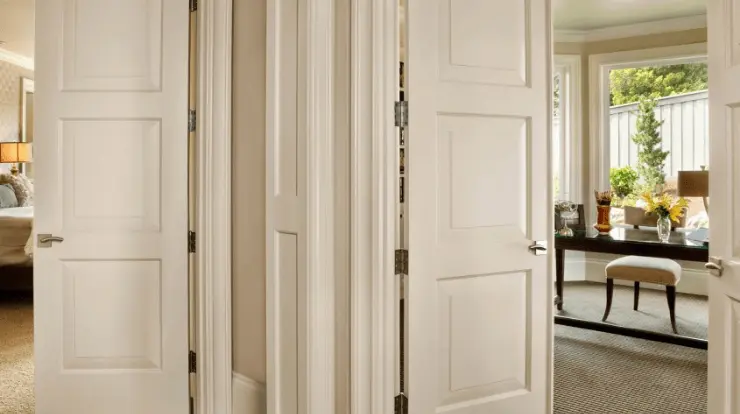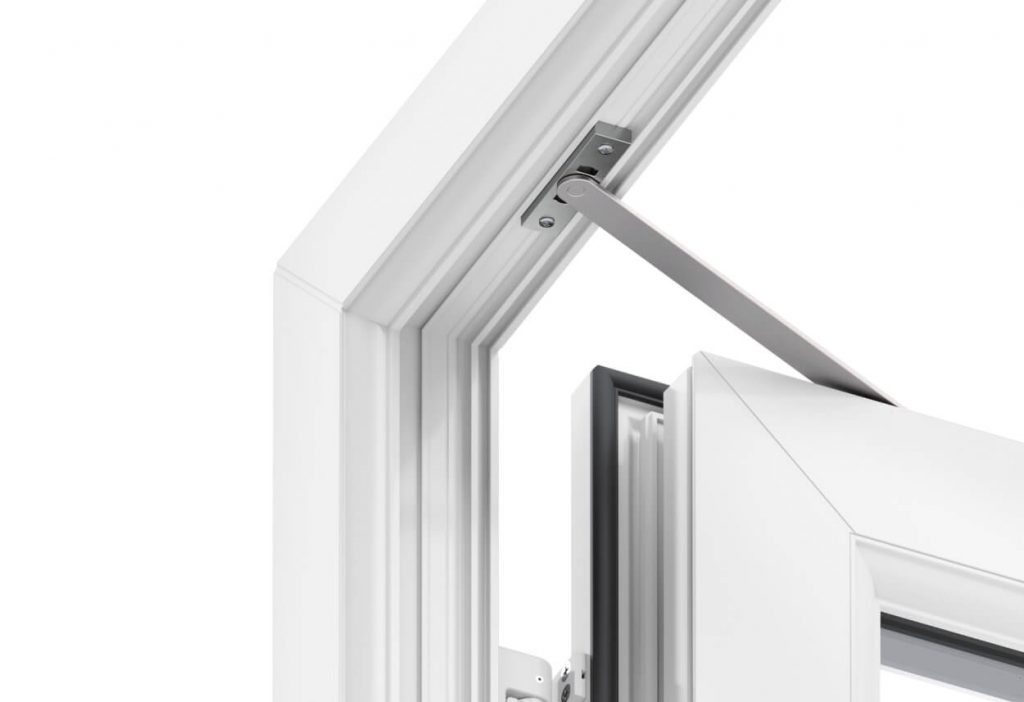How To Stop A Door From Slamming? - 6 Easy Solutions

Do you have a noisy door? No one likes unexpected sounds. Preventing doors from slamming may make your home quieter and more peaceful. You might also find yourself being able to sleep better at night.
To solve the issue, you need to identify its source. Doors slam shut for various reasons.
For example, the doors may be too heavy or not properly hung. Strong winds can also cause them to bang. Closers may work fine, but if they're attached to the wrong part of the door frame, they could make the door swing open instead of close. Sometimes, the door might just randomly start slamming shut.
Fortunately, there are also many ways to deal with slamming door situations.
Read our article about how to repair punch holes in hollow doors.
Finding the reason behind door slam

Hearing a loud bang every day could signify that something needs fixing around your home. But what exactly are you listening to? Are you hearing a slamming door? If so, there might be a problem with the hinges or the latch. Or maybe you're hearing a banging sound coming from inside the house. This could mean that someone is trying to break into your home or your key suddenly become hard to get into the door lock.

A door slam isn't just annoying; it could indicate a serious issue. So, how do you know whether it's a big deal? Here are some signs that you should pay attention to.
1. You Hear Thuds Inside the House
Thudding sounds like a very specific noise. And if you hear thuds inside your home, it could be a warning sign that your home is being broken into. These noises usually happen when someone breaks down a wall or knocks on a window. They can also come from people climbing roofs or jumping off balconies.
2. There's Noise Outside the House
Another common cause of a slamming door is a loose hinge. When you hear a loud bang outside your home, it could mean that one of the doors is swinging too far outwards. It could even mean that the door is completely detached from the frame. Either way, it's probably best to fix this issue immediately.
3. The Doors Swing Open Widely
When you hear a door slam, the door has swung open widely. This happens because the door was not properly closed or latched. If you notice that all of your doors are swinging wide open, it could indicate that someone is trying to get into your home.
Moreover, there is also a possibility that the door slamming started coming after the door gets stuck and you open the stuck door.
List of 6 ways to prevent doors from slamming

1. Use Foam Strips
The first solution is to use foamy strips to dampen the sound. These are often used to soften the closing of the door. You can find them online and in hardware stores. They come in different lengths and can be cut into smaller pieces to fit your door frame perfectly.
You can also purchase adhesive foam strips, which work similarly to the ones above. However, they tend to be thicker and stickier. If you don't want to spend money, you can also try wrapping tape around the edges of the door. This works best if you can put some pressure on the door.
Another option is to go the DIY route. You can make your foam weather stripping out of cardboard and duct tape. Be careful because duct tape does not always adhere well to the door's surface.
You can also use foam strips to reduce condensation. Moreover, if you are facing condensation issues on windows, read our article to solve water condensation on windows overnight.
2. Cushion the door
Felt pads provide another inexpensive option to reduce loud noise and vibration caused by doors slamming shut. They work well because they absorb some energy and dampen the impact.
Such as the weather strips, these pads prevent the door from making such a loud sound as it closes. You'll find them mounted on furniture to protect floors against scratches. We've seen people install felt pads inside the doorframe, just next to the doorknob. This way, no matter how hard you slam the door, it won't make a loud thud.
The small dots have an adhesive backed and can be attached to either side of the doorframe, about an inch or two above where the handle meets the door. Use two dots per pad, spaced apart, to ensure maximum coverage.
If you don't know what sizes to choose, get a variety pack. There are several types, including ones that fit over both sides of the doorframe.
Add two pads spaced an appropriate amount above the lock and handle to help reduce the force of the door hitting the frame.
3. Inspect your door deeply
The door closer is one of those things you probably don't think about too much, but it plays a big role in keeping your home safe and secure. If you're looking into buying a new door closer, here are some tips to keep in mind.
First, inspect the existing door closer. Look for signs of wear and tear. Is there rust around the screws or parts? Does the motor seem sluggish, or does it run fine? Are there cracks in the housing? An easy way to check is to turn the knob and see how far it turns. It could mean something is wrong with the machine if it doesn't turn very far.
Next, adjust the door closer. This is where you'll want to make sure everything is working properly. Turn the adjustment knob clockwise or counterclockwise to tighten or loosen the tension. Make sure the door closes evenly and smoothly. Also, look for leaks in the unit's hose to the wall.
Contact a professional if you find anything out of place or the door doesn't close properly. They can help diagnose what might be causing the problem and offer versatile solutions.
4. Install a door closer
If you want to make sure that doors don't slam shut, there are a few different types of anti-door slam products, such as door closers, you could use. A pneumatic door closer is the most common type of door, using air pressure to open and close it. They work well and are easy to install. You can find them for under $100.
A hydraulic door closer works similarly to a pneumatic door closer, except it uses fluid instead of air. Hydraulic door closers are usually more expensive than pneumatic ones because they require professional installation. But they offer better performance and are quieter.
There are also electric door closers, similar to pneumatic door closer models. Electric door closers use electricity to operate rather than gas. These closers are typically used in commercial settings where unnecessary noise levels must be kept low.
Regardless of the door closer you choose, it needs to be installed properly. Follow the manufacturer's directions carefully, and check our guide to ensure your exterior door closes correctly.
5. Use a rubber band
When you hear a loud bang coming from inside your home, it could mean one thing: someone is trying to break into your house. The best way to prevent this is to install a simple device called a rubber band. A rubber band works like a mini bumper on a car door. When the metal door slams against the wall, the rubber band prevents it from hitting hard enough to cause damage.
You can use a rubber band to stop slamming wooden doors in many ways. First, open the door and place the band around the handle. Next, stretch the band and wrap it over the grip on the opposite side of the door. Finally, position the bar, so it covers both sides of the doorframe. You don't want to put too much force behind the screen door because you risk breaking the glass. If you decide to slam the door, ensure the rubber band is stretched tight enough to avoid damaging the doorframe.
Moreover, if your floor is carpeted, it will reduce the chances of door slamming by 60% and if it still does, make a rug on your carpet at the bottom of the door right at the lowest door hinge or corner.
6. Repair or replace the door hinges
Replacing the door hinges is the most cost-effective solution. The door hinges on your front entryway are responsible for smoothly opening and closing the door. Unfortunately, the normal hinges can wear out or become loose over time. This makes it difficult to open and close the door without causing damage. To fix this problem, you'll need to replace the old normal hinges with new ones that are properly sized and mounted.
To do this job correctly, you'll need to know how to install a heavy steel door hinge. Before you begin, make sure you've got everything you need. You'll want a pair of pliers, a screwdriver, some wood filler, a hammer, a saw, and a drill.
1. Remove the old hinge plate. Use the screwdriver to pry off the old hinge plate. Then, gently pull the old hinge away from the door frame.
2. Install the new hinge strike plate. Using the pliers, hold one end of the hinge while inserting the screw into the hole where the screw meets the hinge plate. Tighten the screw until it feels secure. Repeat this step for both sides of the door.
3. Drill pilot holes for the hinge screws. Next, use the screwdriver to drill 3/8 inch diameter holes into the door frame. Insert the screws into the holes and tighten them down.
4. Sand the edges of the door frame. Finally, lightly sand the doorframe's edges lightly to smooth out any rough spots.
5. Reinstall the door hinges. Once you're done, reattach the old hinge plates and reinstall the door hinges. Be careful not to overtighten the screws.

